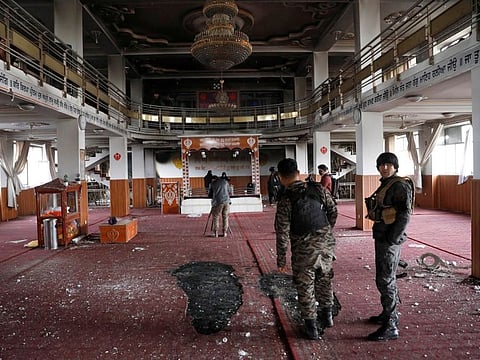Afghanistan is far from secure for minorities
Much more needs to be done to ensure the safety of all Afghans

If the peace agreement reached between the United States and the Taliban in Afghanistan was supposed to assure all those living in that restive land that stability and security would improve, then the attack on a Sikh temple on Wednesday has nothing to underscore that desire.
At least 25 died when a gunman with links to Daesh burst into the complex in the capital of Kabul and opened fire on the unarmed and unprotected worshippers at the gurdwara.
Make no mistake, this attack was carefully planned. The assailaint took advantage of the setting and callously gunned down those praying.
What is disconcerting too is that this attack was carried out by a Daesh terrorist. Clearly, the group is far from being a spent force there and remains an existential threat to Afghanistan’s safety and securityGulf News
And it is a clear indication that — despite the best efforts of the US and members of the international stabilisation forces, the hard work of raising and training a national Afghan police and security force, and the best efforts of the national government in Kabul itself — the nation is festered with militants who kill with abandon.
Over the past 18 years, since the world turned its attention to rooting out Al Qaida from the mountains of Afghanistan — through a laboured and difficult process, and through concerted efforts at laying the foundations for a secular state where all minorities and women were treated equally — there have been occasional glimmers of hope that moderation might take root.
Wednesday’s attack, however, clearly shows that the security forces lack the full ability to control violence when there are gunmen determined to kill for their beliefs, and that minorities in Afghanistan are in a present danger.
The fact that this attack was perpetrated by a single gunman who was able to hold security forces at bay for some hours while he continued his deadly rampage of violence and murder would strongly suggest that the response of the security forces was less than efficient.
And that would also raise questions too on whether there was a reluctance to intervene quickly enough to end the standoff. While Afghan security forces would deny that, the appearance and security lapses over those six hours certainly makes those concerns somewhat valid.
What is disconcerting too is that this attack was carried out by a Daesh terrorist. Clearly, the group is far from being a spent force there and remains an existential threat to Afghanistan’s safety and security.
This also shows that the failure to control both the political and security situation allows for such terrorists and extremists to maintain the ability to carry out these dastardly attacks.



